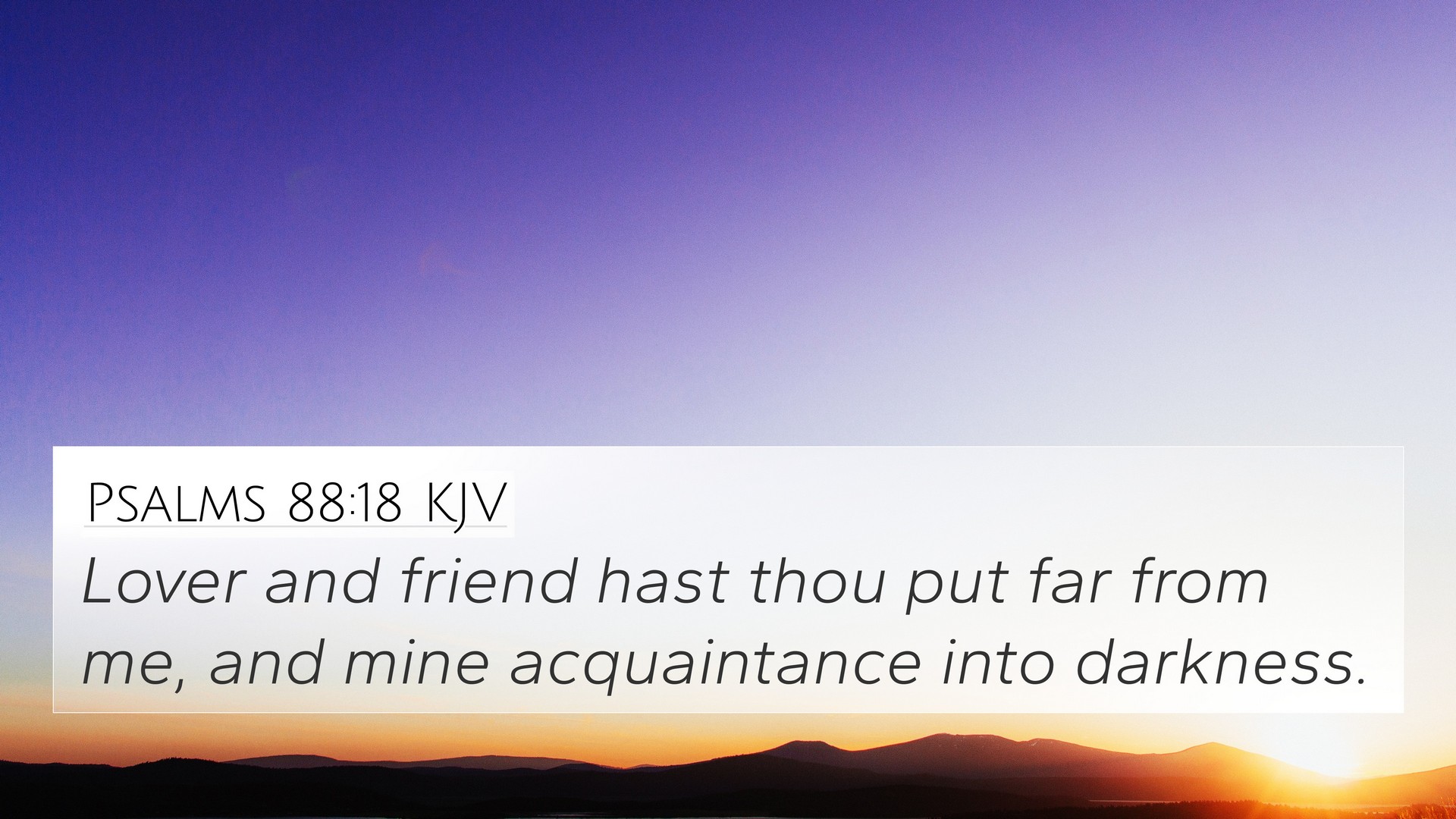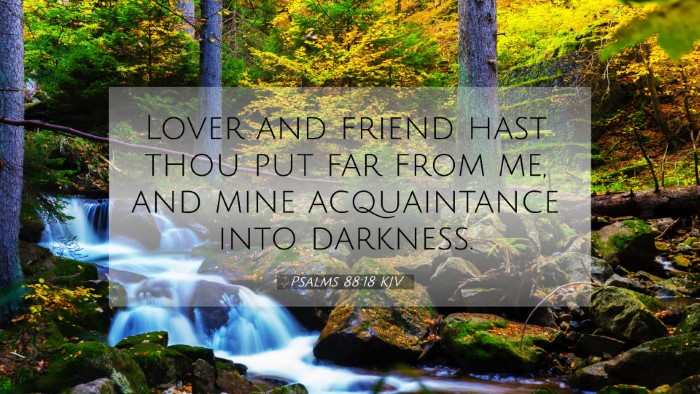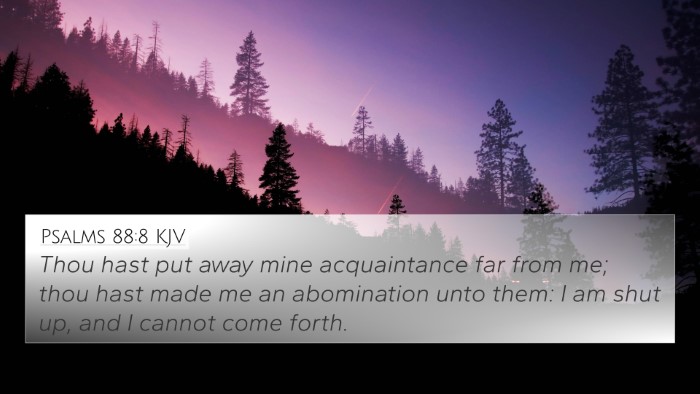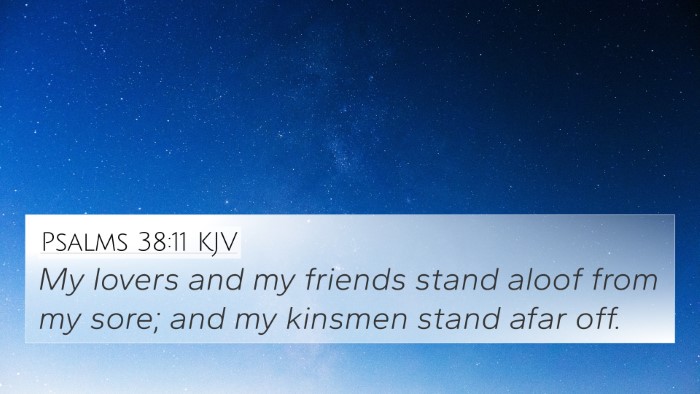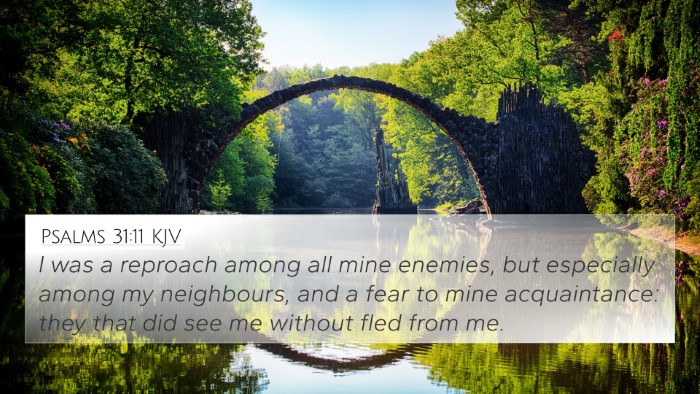Psalms 88:18 - Verse Meaning and Interpretation
Psalms 88:18 states: "You have taken from me friend and neighbor—darkness is my closest friend." This verse reflects a deep sense of isolation and despair, highlighting the psalmist’s experience of abandonment and emotional turmoil. The implications of this verse are profound, as it touches on themes of loneliness, divine silence, and the human condition in suffering.
Contextual Background
In the book of Psalms, many expressions of deep anguish are found, and Ps 88 is particularly noted for its bleakness. This psalm is often categorized as a lament, where the author cries out to God in the face of profound sorrow. The psalmist feels forsaken, and in the concluding verse, the rhetorical impact of referring to 'darkness' as a friend seems to illustrate complete abandonment.
Commentary Insights
-
Matthew Henry:
Henry notes that the psalmist feels as if God has not only distanced Himself but that all social ties and friendships are severed. Darkness personified signifies a state of hopelessness where the psalmist lives in a constant shadow, devoid of light and companionship.
-
Albert Barnes:
Barnes emphasizes the emotional state presented here, highlighting the despair that accompanies feelings of being utterly forsaken. He suggests that the psalmist's cry serves as a candid expression of the human experience of suffering and isolation from both God and man.
-
Adam Clarke:
Clarke points out the significance of the term 'friend' in this context, interpreting it as the deepest human connections that have been lost. He further elaborates that the mention of darkness accentuates the profound depth of the psalmist’s misery, symbolizing a life devoid of joy and companionship.
Thematic Connections
The themes of abandonment and darkness presented in Psalms 88:18 resonate throughout scripture. This verse connects with various other Bible passages that explore similar themes of suffering and divine silence.
- Job 19:13-14: "He has put my brothers far from me, and my acquaintance are completely estranged from me." This reflects a similar experience of isolation and abandonment.
- Matthew 27:46: "My God, My God, why have You forsaken Me?" Here, Jesus expresses a profound sense of abandonment, echoing the sentiments found in Psalms 88.
- Lamentations 3:10-12: "He is to me a bear lying in wait, like a lion in hiding." The imagery of danger and betrayal parallels the sense of despair found in Psalm 88.
- Psalms 22:1: "My God, My God, why have you forsaken me?" Another lament that emphasizes feelings of separation from God.
- Psalms 143:7: "Answer me quickly, O Lord; my spirit fails." This verse shows the urgency in the cry for help amidst despair, mirroring the cry of isolation in Psalms 88.
- Isaiah 50:10: “Who among you fears the Lord and obeys the word of his servant? Let the one who walks in the dark, who has no light, trust in the name of the Lord.” This verse encourages trust amid darkness.
- 2 Corinthians 1:8: "We do not want you to be uninformed, brothers and sisters, about the troubles we experienced in the province of Asia." This references the shared experience of suffering among believers.
Comparative Bible Verse Analysis
The connection between Psalms 88:18 and other passages reveals a significant dialogue on the theme of suffering. This comparative analysis underlines that the experience of feeling forsaken is not isolated but rather a shared human experience.
Tools for Bible Cross-Referencing
Understanding these connections can be facilitated through various tools for Bible cross-referencing, such as:
- Bible concordances
- Bible cross-reference guides
- Cross-reference Bible study methods
How to Use Bible Cross-References
By identifying connections between verses, one can gain deeper insight into theological themes and the overall narrative of Scripture. Understanding how they relate allows readers to draw parallels that enrich their faith journey.
Conclusion: The Importance of Connection
In summary, Psalms 88:18 offers a poignant reflection on despair and isolation. By exploring this verse alongside other cross-referenced passages, we see a broader biblical framework that speaks to the human experience of suffering, the quest for companionship, and the silence that sometimes characterizes divine interaction.
As believers, recognizing these thematic connections enhances our comprehension of Scripture and encourages a reflective response to our own experiences of loneliness and despair.
Encouragement for Further Study
Engaging with these texts, understanding their cross-references, makes a richer Bible study experience. Readers are encouraged to explore these connections, using tools like Bible exterior resources for deeper understanding and application of these themes in their lives.
